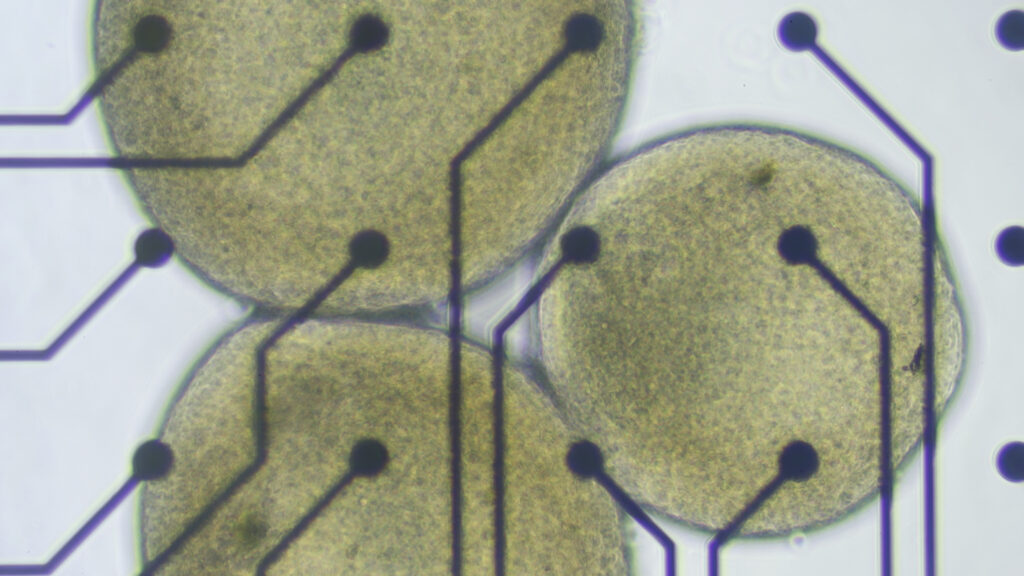Science
Experts Warn Against Overhyped Claims in Organoid Intelligence

Research in brain organoids has sparked significant discussions about the potential and ethical implications of “organoid intelligence.” At a recent meeting held at the Asilomar Conference Center in California, experts raised concerns that exaggerated claims regarding the capabilities of organoids could hinder the field’s progress and lead to regulatory backlash.
Lena Smirnova, a researcher at Johns Hopkins University, has been investigating how lab-grown brain organoids can mimic aspects of human cognitive functions. These organoids, tiny clusters of human brain cells, are designed to communicate through electrical signals. Smirnova and her collaborator, Thomas Hartung, coined the term “organoid intelligence” in 2023, suggesting that these models can learn and respond to their environments.
The promise of organoid intelligence extends beyond basic research. Researchers envision using these organoid-machine hybrids to create biocomputers that could alleviate some environmental impacts associated with traditional computing methods. Both the National Science Foundation and DARPA have invested millions into exploring this innovative field.
Despite the excitement, many in the scientific community caution against inflated claims. At the Asilomar meeting, researchers, ethicists, and legal experts deliberated the boundaries necessary to ensure responsible research. The discussion centered around defining when lab-cultured constructs might exhibit sentience or consciousness.
During the meeting, Sergiu Pasca, a neural organoid researcher at Stanford University, emphasized the importance of accurate terminology. “Using accurate terms that neither hype nor misrepresent the work really does matter,” he stated. Misleading claims could confuse the public and policymakers about the actual capabilities of these systems, jeopardizing future funding and research opportunities.
Tony Zador, a computational neuroscientist at Cold Spring Harbor Laboratory, argued that equating organoid intelligence with silicon-based AI is misguided. He pointed out that while computers follow commands, biological neural circuits operate independently based on their wiring. Zador highlighted the need for a deeper understanding of which neurons are crucial for computation.
Concerns about overregulation emerged as a significant issue. Madeline Lancaster, a pioneer in developing brain organoids at the University of Cambridge, warned that overly broad laws could stifle valuable research aimed at addressing cognitive disorders. She remarked that regulations could inadvertently prevent beneficial work designed to help people.
Smirnova, whose lab focuses on studying environmental toxins and their effects on brain development, defended the concept of organoid intelligence. She views it as a powerful research tool rather than an attempt to create consciousness. “We’re not trying to create a mind in a dish,” she clarified. Smirnova explained that their work is grounded in ethical considerations, involving bioethicists as co-authors on related research papers.
The NSF’s recent initiative, the “Biocomputing through EnGINeering Organoid Intelligence” program, reflects a commitment to integrating ethical discussions into scientific research. Applicants are required to include an ethicist as a co-principal investigator, ensuring that ethical considerations are as crucial as the research itself.
In the private sector, Brett Kagan, CEO of Cortical Labs, has also prioritized ethical discussions surrounding organoid intelligence. His company has developed neuron-powered computers and previously demonstrated that lab-grown neurons could play the video game Pong. Despite initial excitement, Kagan faced backlash when the term “sentience” was used to describe the neurons’ capabilities. Critics argued that such language could misrepresent the findings and endanger the credibility of the field.
Kagan acknowledges the challenges of establishing a shared language within the growing field of organoid research. He calls for collaboration among scientists from diverse disciplines to create a consensus on terminology. “If you can’t have a shared language, the ethics don’t mean anything,” he noted.
As the field of organoid intelligence evolves, it is vital for researchers to navigate these complexities carefully. Balancing innovation with ethical considerations will be essential in shaping the future of this promising area of study. The ongoing dialogue among scientists, ethicists, and policymakers will play a crucial role in determining how organoid intelligence can contribute positively to our understanding of the brain and beyond.
-

 Science2 weeks ago
Science2 weeks agoUniversity of Hawaiʻi Joins $25.6M AI Project to Monitor Disasters
-

 Business3 weeks ago
Business3 weeks agoForeign Inflows into Japan Stocks Surge to ¥1.34 Trillion
-

 Top Stories3 weeks ago
Top Stories3 weeks agoMarc Buoniconti’s Legacy: 40 Years Later, Lives Transformed
-

 Top Stories3 weeks ago
Top Stories3 weeks agoBOYNEXTDOOR’s Jaehyun Faces Backlash Amid BTS-TWICE Controversy
-

 Health4 weeks ago
Health4 weeks agoInnovative Surgery Restores Confidence for Breast Cancer Patients
-

 Sports1 month ago
Sports1 month agoSteve Kerr Supports Jonathan Kuminga After Ejection in Preseason Game
-

 Science1 month ago
Science1 month agoChicago’s Viral ‘Rat Hole’ Likely Created by Squirrel, Study Reveals
-

 Lifestyle1 month ago
Lifestyle1 month agoKelsea Ballerini Launches ‘Burn the Baggage’ Candle with Ranger Station
-

 Entertainment1 month ago
Entertainment1 month agoZoe Saldana Advocates for James Cameron’s Avatar Documentary
-

 Top Stories3 weeks ago
Top Stories3 weeks agoCarson Wentz Out for Season After Shoulder Surgery: Urgent Update
-

 Politics1 month ago
Politics1 month agoDallin H. Oaks Assumes Leadership of Latter-day Saints Church
-

 Business1 month ago
Business1 month agoTyler Technologies Set to Reveal Q3 2025 Earnings on October 22









